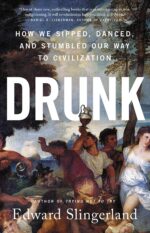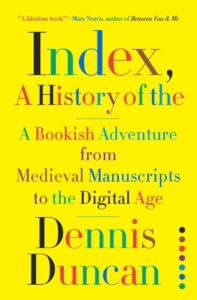
Drunk: How We Sipped, Danced, and Stumbled Our Way to Civilization, by Edward Slingerland (Little, Brown; 384 pp., $29.00). When governments anointed certain businesses essential during 2020’s crazy pandemic climax, liquor stores made the cut. Federalist #10 would argue that venal legislators succumbed to “the mischiefs of faction”— here, the liquor lobby’s demands. A Scientific American op-ed justified liquor stores as essential for the 15 million people in the U.S. with alcohol-use disorder (aka lack of impulse control), which disproportionately harms “women, older adults, racial and ethnic minorities and economically disadvantaged individuals.” Politics masquerades as science during emergencies.
Edward Slingerland’s Drunk provides better, and dare I say more scientific, rationales for keeping spirit shops open next time we collectively lose it. Humans use alcohol to overcome their “selfish, suspicious, narrowly goal-oriented primate” nature. Alcohol relaxes us, opening us up to new experiences and easing encounters with strangers. Chimpanzees, like sober humans, put up defenses against those they view as threats. From an evolutionary perspective, we “survive and flourish” on the individual level and “endure and expand” on the cultural level when we cognitively alter ourselves with booze.
Contrary to every stultifying twelve-step cliché, we need to get drunk. Humans must balance Apollo’s ruthless demands for rationality against Dionysus’s open invitation to party. Alcohol takes our prefrontal cortex off-line temporarily, freeing our imaginations and releasing our inhibitions. And while the fanatical Alcoholics Anonymous cult only sees harm in the latter, Slingerland shows how drinking’s societal benefits far outweigh its individual health costs. Specifically, alcohol enhances “our creativity, cultural openness, and communal feelings.”
Please don’t use Drunk to justify gargling with tequila as part of your morning routine. Distilled spirits and drinking in isolation—two more reasons to curse modernity—distort alcohol’s pro-social benefits. Slingerland carefully distinguishes between the positive lubricating qualities of beer and wine, proven over millennia, and the destructive invention of distilled spirits, which raise our blood alcohol content too far and too fast. Likewise, downing a case of beer while cursing at MSNBC all by yourself doesn’t foster conviviality. But next time we lock down, hand Drunk to those puzzled as to why liquor stores get to stay open, and should.
(John Greenville)

Index, A History of the, by Dennis Duncan (W. W. Norton; 352 pp., $30.00). All readers of nonfiction take for granted the ability to find whatever they’re looking for quickly by recourse to an index. In this playful but profound work, literary historian Dennis Duncan shows that this apparent afterthought has an intriguing history of its own—that the index is not just indispensable but can be a work of expressive genius.
Indexing is partly instinctive—we all have a mental “index” of our possessions, for example. Librarians in particular, from Alexandria onwards, have felt the necessity of organizing unwieldy information. Greek library scrolls often bore sillybos tags summarizing their contents (thus “syllabus”), and Anglo-Saxons made alphabetical lists, but Duncan credits two 13th century churchmen—Robert Grosseteste of Lincoln, and Hugh of Saint-Cher—with the first great indexes. One a subject index, the other a concordance, these were the search-engines of yore, reflecting the urgent need to interrelate encyclopædic interests in an age of intellectual endeavor.
Indexes became increasingly sophisticated with the advent of printing, especially after page-numbering appeared in the 15th century. William Caxton’s 1483 translation of The Golden Legend included an index to help readers look up individual saints. By 1516, Ludovico Ariosto’s epic poem, Orlando Furioso, contained a scene in which the English knight Astolfo works out how to escape from a fairy castle by searching the index of his spell book.
The index was nevertheless long controversial, accused of allowing lazy thinkers to avoid reading texts or of being obliged to remember things. Indexes were also weaponized. The Whig historian Thomas Macaulay fretted that some “damned Tory” might index his 1848 History of England. The index of J. Horace Round’s 1895 Feudal England enumerates alleged errors made by another medieval historian, with over a page of references including “his bias, 319, 394-7” and “imagines facts, 352, 370, 387, 432.”
William F. Buckley, Jr. used the index to his 1966 book, The Unmaking of a Mayor, to goad Norman Mailer. Knowing the first thing Mailer would do on receiving a book mentioning him would be to look himself up in the index, Buckley scribbled “Hi!” in red on the appropriate page.
Duncan closes cleverly with two indexes to his own book, one written by computer and one by a professional, proving that artficial intelligence cannot match the subtle understanding of a human compiler. The future of the index seems secure, and thanks to this coruscating conspectus, its past is also now much better known.
(Derek Turner)
Leave a Reply